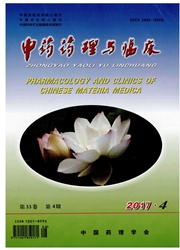

 中文摘要:
中文摘要:
目的:观察附子与人参配伍后对乌头碱心脏毒性的影响,为中药复方配伍减毒提供科学依据。方法:采用静注乌头碱20μg/kg诱发大鼠心率失常,观察参附及其配伍对心率失常的影响。胺碘酮组15mg/kg、受试药人参组0.5g/kg、附片组0.5g/kg、参附组0.75g/kg。结果:乌头碱模型组心率先加快后减慢,参附组和胺碘酮治疗组心率均出现显著性下降,Q-T间期和P-R间期明显延长。参附组,人参组和胺碘酮治疗组均能推迟房性早搏发生时间。大鼠心电图变化的分级评价显示参附组和胺碘酮治疗组均没有出现严重的心律失常。结论:人参配伍附子能明显减轻其主要毒性成分乌头碱引起的实验性心律失常,人参配伍附子减轻了乌头碱心脏毒性。
 英文摘要:
英文摘要:
To observe the effect of ginseng and radix aconiti praeparata on the cardiotoxicity of aconitine, supplying theoretic basis for clinical and new medicine in using Shenfu Injection. Methods: The arrhythmia model was prepared by intravenous injections of aconitine 20μg/kg in rats, ECG changes were observed by BioPAC MP-100. amiodarone group 15mg/kg, Renshen injection group 0.5g/kg, Fupian injection group 0.5g/kg,Shenfu injection group 0.75g/kg. Results: The heart rate of Shenfu group and amiodarone group was accelerated significantly. While, Q-T interval and P-R interval all appeared significant decline. The heart rate of acontine group was accelerated and then prolonged. Shenfu group, ginseng group and amiodarone group all could delay the appearing time of VPB . The ECG changes of grading evaluation showed that there was no occurrence of serious arrhythmia. Conclusions: Ginseng and radix aconiti praeparata could obviously relieve arrhythmia induced by aconitine, ginseng and radix aconiti praeparata reduce toxicity of aconitine.
 同期刊论文项目
同期刊论文项目
 同项目期刊论文
同项目期刊论文
 期刊信息
期刊信息
